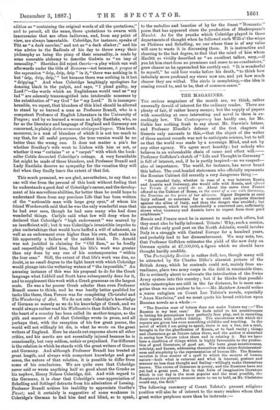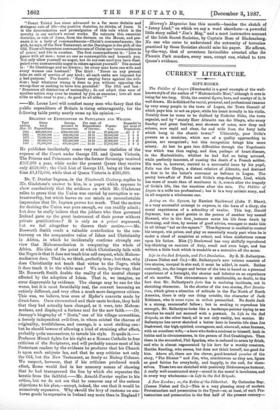THE MAGAZINES.
THE serious magazines of the month are, we think, rather unusually devoid of interest for the ordinary reader. There are plenty of fair, if rather heavy essays ; but the supply of papers with something at once interesting and novel in them is ex- ceedingly low. The Contemporary has hardly one, for Mr. Geikie has nothing fresh to say about Mr. Darwin's letters, and Professor Elmslie's defence of the first chapters of Genesis only amounts to this,—that the object of the writer of those ancient records was not to anticipate science, but to tell us that the world was made by a sovereign Mind, and not by any other agency. We agree most heartily ; but nobody who believes in an unbreakable chain of cause and effect will.— Professor Geffeken'e sketch of" Life and Thought in Germany" is full of interest, and, if he is partly inspired—as we suspect— also of importance. The world, for instance, has never heard this before. The cool-headed statesman who officially represents the Russian Cabinet did recently a very dangerous thing " He sounded Italy, whether in case of a war between Russia and Austria and Germany, she would side with Russia, and offered her Trieste if she would do so. About the same time France ' offered to the Cabinet of Rome, in the event of a war with Germany, the Trentino as the price of her alliance. Signor Depretis at once flatly refused to entertain for a moment such projects directed against the allies of Italy, and thus the danger was avoided ; but the movement, which was undoubtedly a concerted one, sufficiently shows what Uermany and Austria have to expect from their good neighbours."
Russia and France must be in earnest to make such offers, but they must also be badly informed. Trieste! Why, such a cession,
that of the only good port on the North Adriatic, would involve Italy in a struggle with Central Europe for a hundred years, and probably lead to her dismemberment. We may note, too, that Professor Geffcken estimates the yield of the new duty on German spirits at £7,500,000, a figure which we should have thought hardly credible.
The Fortnightly Review is rather dull, too, though many will be attracted by Sir Charles Dilke's alarmist picture of the British Army, which he contends could not, mainly from un- readiness, place two army corps in the field in reasonable time. He is evidently about to advocate the introduction of the Swiss Army system into this country ; but if he thinks that possible while catastrophes are still in the far distance, he is more san- guine than we can profess to be.—Mr. Matthew Arnold writes a :warm enlogium on Count Leo Tolstoi's novels, especially "Anna Karenine," and we must quote his broad criticism upon Russian novels as a whole
"The Russian man of letters does not make Nature say t—' The Russian is my best race.' He finds relief to his sensitiveness in letting his perceptions have perfectly free play, and in reoording their reports with perfect fidelity. The sincereness with which the reports are given has even something childlike and touching. In the novel of which I am going to speak, there is not a line, not a trait, brought in for the glorification of Russia, or to feed vanity things and characters go as Nature takes them, and the author is absorbed in seeing how Nature takes them and in relatiog it. But we have here a condition of things which is highly favourable to the produc- tion of good literature, of good art. We have great sensitiveness, subtlety, and finesse, addressing themselves with entire disinterested- noes and simplicity to the representation of human life. The Russian novelist is thus master of a spell to which the secrets of human nature—both what is external and what is internal, gesture and manner no less than thought and feeling—willingly make themselves known. The crown of literature is poetry, and the Russians have nor. yet had a great poet. But in that form of imaginative literature which in our day is the most popular and the most possible, the Russians at the present moment seem to me to hold, as Mr. Gladstone would say, the field."
The following summary of Count Tolstors present religions position will also be of interest to the many readers whom that great writer perplexes more than he instructs :—
"Count Tolstoi has sines advanoed to a far more definite and stringent rule of life—the positive doctrine, he thinks, of Jesus. It is the determination and promulgation of this rule which is the novelty in oar author's recent works. He extracts this essential doctrine, or rule of Jesus, from the Sermon on the Mount, and pre- sears it in a body of commandments—Christ's commandments ; the pith, he says, of the New Testament, as the Decalogue is the pith of the Old. These all-important commandments of Christ are 'commandments of peace,' and five in number. The first commandment is 'Live in peace with all men ; treat no one as contemptible and beneath you. Not only allow yourself no anger, bat do not rest until you have dissi- pated even unreasonable anger in others against yourself.' The second is No libertinage and no divorce ; let every man have one wife and every woman one husband.' The third : 'Never on any pretext take an oath of service of any kind ; all snob oaths are imposed for a bad purpose.' The fourth : Never employ force against the evil- doer ; bear whatever wrong is done to you without opposing the wrong-doer or seeking to have him punished.' The fifth and last Renounce all distinction of nationality; do not admit that men of another nation may ever be treated by you as enemies ; love all men alike as alike near to you ; do good. to all alike.'"
—Mr. Leone Levi will comfort many men who fancy that the public expenditure of Britain is rising extravagantly, for the following table pretty nearly sums up his opinion :— RELATION OF EXPENDITURE TO POPULATION AND WEALTH.
Year Grose Income Per cent. of Expendit're
ending total assessed to Expenditure Pools, per head of
If sr. 31. Expenditure. Income-tax. of Income. ton. Population.
1855 ... 269,000,000 meows 2540 27.eOO,000 22 9 7
596.000.00O 16.81 m,000,000 2 5 6 1875 ... 73.000.000 549,000,000 1229 82,800,000
1885 .. stooeme 631,000,000 14.10 36,300,000 0 81 0
1887 "'91,000,000 630 003 000 14 24 . . 37.000.000 2 9 2
He publishes incidentally some very carious statistics of the expense of the Court under George III. and Queen Victoria. The Princes and Princesses under the former Sovereign received £507,288 a year, while under the present Queen they receive only 2158,000 ; the Civil List of George III. being at the same time £1,172,000, while that of Queen Victoria is £885,000.
Dr. T. Dunbar Ingram, in the Nineteenth, Century, replies to Mr. Gladstone's answer to him, in a paper which appears to show conclusively that the evidence on which Mr. Gladstone relies to prove that the Union was carried by corruption is un- trustworthy, but which leaves on our minds an uncomfortable impression that Dr. Ingram proves too much. That the motive for desiring the Union was pure enough, we can readily admit ; but does he really believe that the jobbers who then governed Ireland gave up the great instrument of their power without private gratifications? It is only an a priori argument, but we fail altogether to discern their motive—Mr. Bosworth Smith sends a valuable contribution to the con- troversy on the comparative value of Islam and Christianity in Africa, in which he incidentally confirms strongly our view that Mahommedanism is conquering the whole of Africa. His idea of the point at which Christianity fails with the Negro is that it does not teach him self-respect, while Mahom- medanism does. That is, we think, perfectly true ; but then, why does Christianity not teach that virtue to the Negro, while it does teach it to the white man ? We note, by-the-way, that Mr. Bosworth Smith doubts the reality of the mental change effected by the adoption of Islam. That is, we imagine, an error disprovable by evidence. The change may be one for the worse, kit it is most formidably real, the convert becoming an entirely different, and very often a much more dangerous citizen. This was, we believe, true even of Hyder's converts made by direct force. Once circumcised and their caste broken, they held that they had actually been changed, as it were, into Mahom- medans, and displayed a furious zeal for the new faith.—Dr, Jessopp's biography of "Doris," one of his village unworthies, a fiercely independent evil-liver, in whom existed the charms of originality, truthfulness, and courage, is a most striking one; but he should beware of allowing a kind of straining after effect, probably quite unconscious, to invade his style. It spoils it,— Professor Mivart fights for his right as a Roman Catholic to free criticism of the Scriptures, and will probably amaze most of his Protestant readers by the evidence he produces that his Church is upon such subjects lax, and that he may criticise not only the Old, but the New Testament, as freely as Bishop Colenso. We suspect, however, that if his criticism produced much effect, Rome would find in her armoury means of showing that he had transgressed the line by which she separates the heretic from the faithful.—Mr. Arnold-Forster replies to his critics, but we do not see that he removes any of the serious objections to his plan,—except, indeed, the one that it would be excessively expensive. Why °You'd the levy of customs on sea- borne goods be expensive in Ireland any more than in England ? Murray's Magazine has this month—besides the sketch of "Jenny Lind," on which we say a word elsewhere—a powerful little story called "Jim's Meg," and a most instructive account of the Irish Secret Societies, by Captain Ross of Bladensberg. No one who cares to understand the extremity of terrorism practised by these Societies should miss his paper. He affirms, by-the-way, that of seventeen Invincibles arrested after the Phrenix Park murders, every man, except one, wished to tarn Queen's evidence.










































 Previous page
Previous page